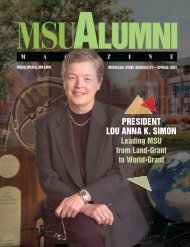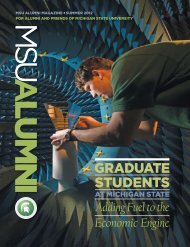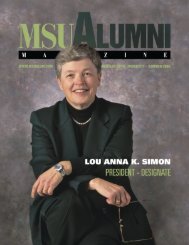Download - MSU Alumni Association - Michigan State University
Download - MSU Alumni Association - Michigan State University
Download - MSU Alumni Association - Michigan State University
You also want an ePaper? Increase the reach of your titles
YUMPU automatically turns print PDFs into web optimized ePapers that Google loves.
Mei Wei Chang (right) is researching predictors<br />
that can help change behaviors that lead to obesity<br />
in low income women.<br />
Denise Saint Arnault (left) is conducting research<br />
on domestic violence survivors within Asian<br />
immigrant communities.<br />
young girls understand what they<br />
can do to change their behaviors<br />
and improve their health habits.<br />
That’s where Karen Patricia<br />
Williams’ research comes in.<br />
Williams, an associate professor<br />
of obstetrics, gynecology and<br />
reproductive biology in <strong>MSU</strong>’s<br />
College of Human Medicine,<br />
is the lead author of a study of<br />
341 Arab-American, African<br />
American and Latina women<br />
that examined levels of medical<br />
mistrust and assessed the impact<br />
on whether the participants<br />
received recommended breast<br />
cancer screenings. She found<br />
that nearly 70 percent of minority<br />
women agree that health care<br />
organizations sometimes deceive<br />
or mislead patients, which can<br />
prevent women from getting<br />
breast cancer screenings.<br />
Health communications<br />
researcher Kami Silk, associate<br />
professor in the College of Communication<br />
Arts and Sciences,<br />
is studying the most effective<br />
strategies for communicating<br />
breast cancer prevention messages<br />
to young girls. Adolescent girls<br />
are a primary target audience for<br />
messages about the importance of<br />
regular mammograms, self-examination<br />
and a healthy lifestyle,<br />
because early adoption of healthy<br />
behaviors may help reduce the<br />
risk of getting cancer later in life.<br />
Improving quality of life<br />
<strong>MSU</strong> researchers are also<br />
studying how women live with<br />
cancer. Barbara Given, <strong>University</strong><br />
Distinguished Professor and<br />
associate dean for research in the<br />
<strong>MSU</strong> College of Nursing, is a<br />
pioneer in oncology nursing who<br />
has received millions of dollars<br />
in federal funding during her 44-<br />
year tenure with <strong>MSU</strong>. She has<br />
spent her career developing interventions<br />
aimed at helping patients<br />
and their family caregivers<br />
manage symptoms from cancer<br />
disease and treatment at home.<br />
Given and her husband, College<br />
of Human Medicine Professor<br />
Bill Given, have developed a webbased<br />
symptom management<br />
toolkit that links cancer patients’<br />
symptoms and their reports of severity<br />
with intervention strategies<br />
directed toward patients.<br />
Professor Gwen Wyatt of<br />
<strong>MSU</strong>’s College of Nursing found<br />
that biological-based therapies<br />
such as diet supplements and<br />
vitamins are the most popular<br />
complementary and alternative<br />
medicines (CAM) for women recovering<br />
from breast cancer. She<br />
is using the results of this study,<br />
which was funded by the U.S.<br />
Dept. of Defense, to help women<br />
identify which therapies will be<br />
most effective for them.<br />
Her colleague in nursing, Assistant<br />
Professor Costellia Talley, is<br />
studying differences in the quality<br />
of life experienced by African<br />
American breast cancer patients<br />
50 years of age and older. Despite<br />
the lower incidence of breast cancer<br />
in African American women,<br />
they are still more likely to be<br />
diagnosed with aggressive breast<br />
cancer and have higher mortality<br />
rates from breast cancer than<br />
white women. Older African<br />
American cancer survivors experience<br />
poorer functional status<br />
and have more symptoms than<br />
other ethnic groups. Because<br />
of these health disparities, she<br />
anticipates that breast cancer affects<br />
African American women’s<br />
quality of life differently than<br />
white women’s.<br />
Assuring reproductive<br />
health<br />
Another area in which <strong>MSU</strong><br />
researchers are making notable<br />
progress is women’s reproductive<br />
health, from understanding<br />
how women can best prepare for<br />
pregnancy and have successful<br />
pregnancies, to uncovering health<br />
issues related to pregnancy.<br />
Last year, <strong>MSU</strong> established<br />
a new Center for Women’s<br />
Health and Reproduction<br />
Research, supported by a $6.8<br />
million award from the National<br />
Institute of Child Health and<br />
Human Development. The center,<br />
one of only 15 nationwide,<br />
is a collaborative effort of <strong>MSU</strong>,<br />
Spectrum Health and the Van<br />
Andel Institute, and is housed<br />
in the Van Andel Institute in<br />
Grand Rapids, Mich.<br />
Click Right Through for <strong>MSU</strong><br />
alumni.msu.edu<br />
Page 35

















